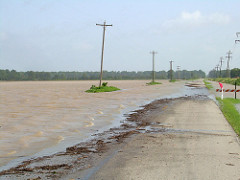
Helping Your Kids When Disaster Strikes

- Encourage your child to share her/his feelings about what is going on, and be patient as they do so. It is important that parents and other adults give kids room to express their fear and beliefs about what is happening. This will be easier for some kids than others. Some don't share much of anything about their feelings, even in the best of times; but helping them understand that they are safe and you are listening is a step in the right direction.
- Clarify misunderstandings about risk and danger by answering questions. Children, especially younger ones, are likely to fear that they are still in danger even when you know they are safe. Explaining safety plans, reassuring them in a calm voice, and answering their questions patiently will help them feel safer. Although you are also stressed, their little minds can't quite comprehend when danger has passed.
- Monitor and limit media exposure. Especially if your area is still under imminent threat (the river has not yet crested, the rain is still falling), limit the type and duration of news that your children are exposed to. In our current 24-hour news cycle, news channels have lots of time to fill, and they tend to do so by repeating the same dire warnings over and over. For a frightened child, watching cars spinning off the road in high water is terrifying. Older children and teens may be very curious about what is going on, and they are likely able to handle more information. Younger kids need to be insulated and have their information filtered through a trusted adult.
- Help your kids to engage in as much routine behavior as possible. Kids thrive on routine, and in uncertain times, that routine is highly comforting. Try to maintain a typical bedtime routine even if you are displaced. Spend extra time with your child to reassure them that they are safe and that you are too.
When the immediate threat has passed and damage can be assessed:
- Calmly give factual information to your child about what has happened. Although it may be difficult to share, be sure your child knows what has happened, and let them know your plans for recovery and safety.
- Don't rush recovery. Take each day as it comes. Some days, you and your child will be energized and feel good about the future, but other days, you may be upset or worried. Each day is different, so take things day-by-day.
- Find joy where you can. If you have been displaced, lost possessions, or lost a family member or pet, it may be difficult to find happy times. Look for them where you can. Take your child for pizza, play a game, sing a favorite song. Children need to be reassured that the hurt they feel is only temporary; and that reassurance is good for adults too.
- Allow your child to assist in recovery. Give your child safe, age appropriate ways to aid the family in recovery. Younger children can help with pets, tidy their spaces, help with laundry, or assist in food service. Older children can help with younger children, assist in food preparation, and attend to safe clean-up tasks like picking up sticks around the yard or organizing their spaces. Teens can assist in most ways an adult could help, but they will likely need more guidance.
- Re-establish routines as soon as possible. If schools are open, allow your child to go. If their teams are practicing, let them participate. If the neighborhood kids are playing, let them join in. Normalcy will be very comforting.
- Offer lots of reassurance and personal contact. Hugs, chats, and pats on the back will help your child understand that you love them and that you are proud of them. Give them lots of praise for their help and resilience.
Follow these links for more information about emergency preparedness, coping with a disaster, and reactions to disaster by age. Family Life has great programs for coping with stress and finding joy in tough times. Follow the links provided, or contact your county extension agent for access to these programs.
References:
FEMA. (2015). Coping with Disaster. Retrieved from http://www.fema.gov/coping-disaster on March 10, 2016.
Mental Health America. (2016). Coping with Disaster. Retrieved from http://www.mentalhealthamerica.net/conditions/coping-disaster on March 11, 2016.
Special thanks to Rebecca Simon for sharing your personal experience of helping kids through disaster.
Photo credit: U of Arkansas System Division of Agriculture photo by Eugene Terhune